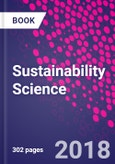Sustainability and sustainable development are increasingly important guiding principles across administrative levels, functional sectors and scientific disciplines. Policymakers, practitioners and academics continue to wrestle with the complexity of risk, resilience and sustainability, but because of the necessary transdisciplinary focus, it is difficult to find authoritative content in a single source.
Sustainability Science: Managing Risk and Resilience for Sustainable Development presents the state of the world in relation to major sustainability challenges and their symptomatic effects, such as climate change, environmental degradation, poverty, disease and disasters. It then continues by elaborating on ways to approach and change our world to make it a safer and more sustainable place for current and future generations. The natural, applied and social sciences are woven together throughout the book to provide a more inclusive understanding of relevant processes, changes, trends and events.
- Shows how disturbances, disruptions and disasters have always been intrinsic byproducts of the same human-environment systems that supply us with opportunities, as well as what implications that has for policy and practice towards sustainable development today- Introduces a new approach for grasping and addressing issues of risk and resilience in relation to sustainable development that is firmly rooted in a comprehensive philosophical and theoretical foundation and clearly linking the conceptual with the practical- Presents a holistic agenda for change that includes a more explicit role of science, reinforced focus on capacity development and the overall necessity of fundamental social change- Features more than 150 figures, full-color photographs, diagrams, and illustrations to highlight major themes and aid in the retention of key concepts
Table of Contents
1. Introducing the Book
Part I. The State of the World 2. Our Past Defining Our Present 3. Our Sustainability Challenges 4. Our Disturbances, Disruptions and Disasters in a Dynamic World
Part II. Approaching the World 5. Conceptual Frames for Risk, Resilience and Sustainable Development 6. Resilience-From Panacean to Pragmatic 7. The World as Human-Environment Systems
Part III. Changing the World 8. Science and Change 9. Developing Capacities for Resilience 10. Social Change for a Resilient Society 11. Concluding Remarks








